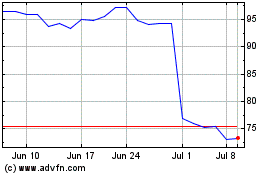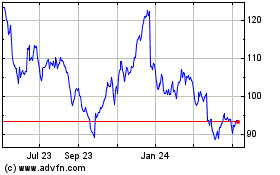Boris Berian gains sudden popularity after Nike sues him over
endorsement deal
By Sara Germano
EUGENE, Ore. -- Boris Berian punched his ticket to the Rio Games
at the U.S. Olympic track and field trials and spent the weekend
signing autographs and posing for photos with fans.
It was a scene that few expected earlier this year. But the
little-known runner has become a celebrity since an unusual lawsuit
by Nike Inc. accused Mr. Berian of breaching an endorsement
contract by competing in New Balance sneakers. Nike had sought to
stop Mr. Berian from running at the trials, until it dropped its
suit.
"My mother and sister send me articles from random, random
journalists," said Mr. Berian. "But I just keep to myself, stick
with the team, and just try to focus on running and training." The
world indoor 800 meter champion finished second at Monday's event
and qualified for the U.S. team.
The soft-spoken 23-year-old, who was flipping burgers at
McDonald's not long ago, has become an unlikely pawn in a tense
debate within the running world about clauses in some contracts
that seek to reduce athletes' pay if they fail to meet certain
standards.
In the suit brought by Nike in May, the company claimed it
retained its sponsorship of Mr. Berian by matching a rival offer
from New Balance Athletics Inc. The Nike contract, however,
contained so-called reduction clauses that gave the company the
option to lower his base pay if Mr. Berian didn't compete in enough
races, meet performance targets or stay high in the world
rankings.
Mr. Berian's new contract with New Balance doesn't include such
reductions, the Boston-based company said.
When Nike dropped the lawsuit last month, the company said it
wanted to "eliminate [the] distraction" for Mr. Berian ahead of the
Olympic trials. The runner said he "didn't realize how much it
bothered me until they dropped it," which allowed him to renew his
focus on training and sign with New Balance last week.
Still, Mr. Berian said, the dropped suit leaves some questions
within professional track unanswered. Other athletes, coaches,
agents and sportswear executives say the endorsement process is
often shrouded in secrecy, leaving athletes scratching their heads
as to who receives reduction clauses, why and when.
"Contracts are just a whole chess match. The athletes think it's
a partnership, but it's just a chess match," said Phoebe Wright, a
professional middle-distance runner who finished 6th in the women's
800 meter final on Monday.
Ms. Wright, who is sponsored by Nike, said confidentiality
clauses forbid her from speaking about her own endorsement and they
also make it difficult to ascertain what her rivals are paid, or
even when shoe companies opt to activate a reduction.
In its court filings, Nike had argued that reductions were
standard in the industry and had sought to clarify with Mr.
Berian's agent whether or not the New Balance offer contained such
clauses.
Ms. Wright said she thought it would be unusual for a contract
to explicitly spell out what it didn't include.
"If they're not going to give you a pony, it usually doesn't say
'I'm not going to give you a pony.' You don't put things that are
not included in a contract," she said.
In a statement, Nike said it "legitimately exercised our right
to match the New Balance offer and believe we would prove this at
trial. It is important that agreements [that] endorsers, endorsees
and agents sign together are appropriately upheld." Nike reiterated
its decision to eliminate distractions for Mr. Berian and wished
him luck.
Spencer Nel, the head of running sports marketing at Adidas AG,
said the German sportswear maker includes reductions but says the
terms aren't activated automatically.
"When I don't perform at work, I get penalized or stand the risk
of getting fired," Mr. Nel said. "How and why should an athlete be
treated differently when they don't perform at 'work'?"
Of rival companies that don't offer reductions, Mr. Nel said,
"Once they have a large portfolio of athletes not performing and
who are literally sitting at home watching TV, and they have no
recourse, they will change their thinking."
At the U.S. trials here, some athletes spoke about the reduction
issue openly. Chris Derrick, another runner for Nike who battled
injury earlier this year before finishing fifth in the men's 10,000
meters on Friday, said he was grateful Nike opted not to reduce his
base pay when they could have.
After competing in early rounds of the 800 meters here, Mr.
Berian removed his New Balance spikes to reveal custom insoles that
bear his name.
Mr. Berian said he hopes other athletes can at least learn from
his case.
"It's definitely opened up to the public, even future athletes,
what contracts are all about," he said. "It's not just signing
something and getting money."
One irony in Mr. Berian's story is that he will have to don a
Nike uniform in Rio, as they are the outfitter of the U.S. track
and field team. Asked Sunday if he would have mixed feelings about
it, Mr. Berian said, "I'm okay with that. I'm not representing
Nike, I'm representing the U.S.A."
Write to Sara Germano at sara.germano@wsj.com
(END) Dow Jones Newswires
July 05, 2016 02:48 ET (06:48 GMT)
Copyright (c) 2016 Dow Jones & Company, Inc.
Nike (NYSE:NKE)
Historical Stock Chart
From Mar 2024 to Apr 2024

Nike (NYSE:NKE)
Historical Stock Chart
From Apr 2023 to Apr 2024
